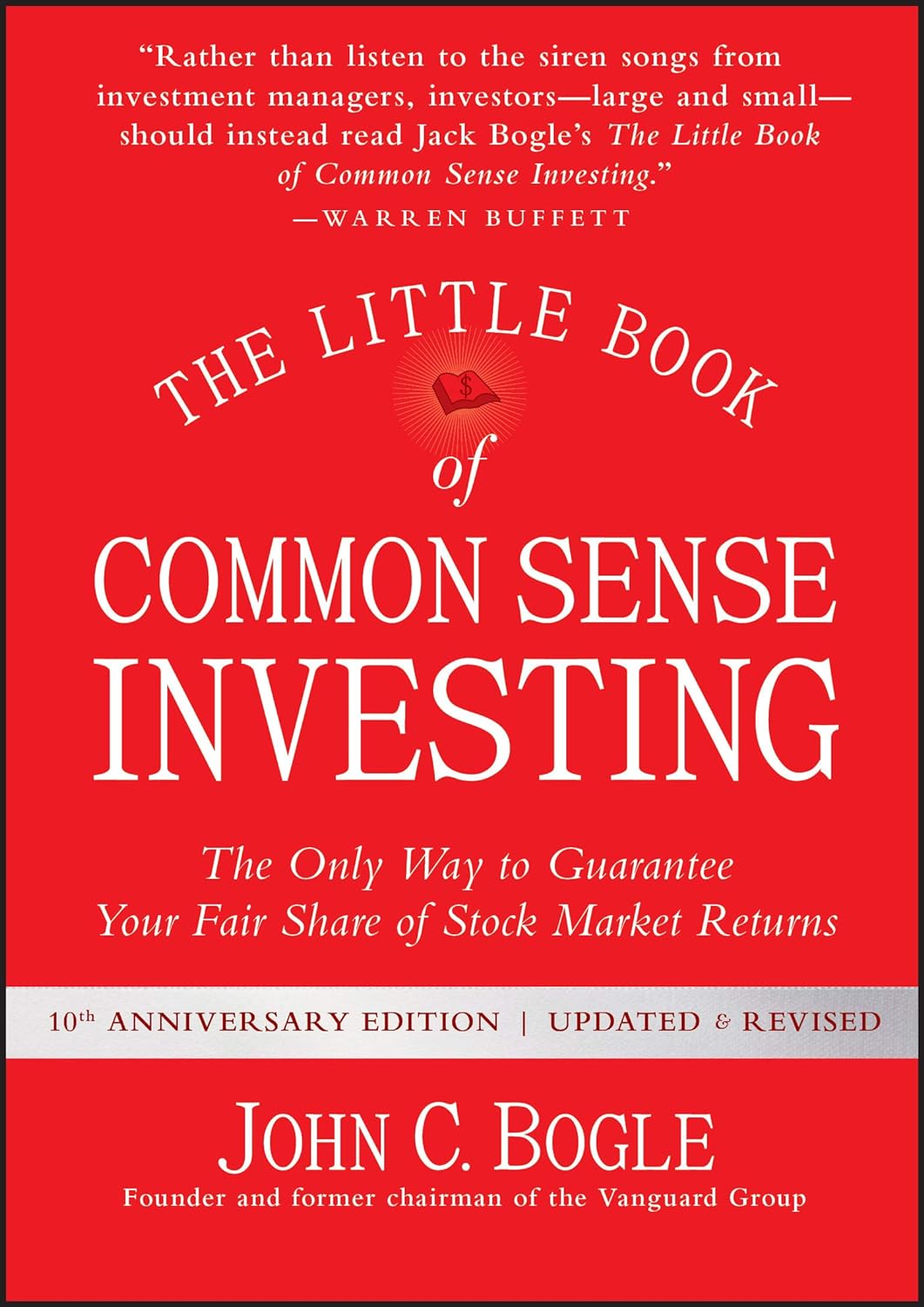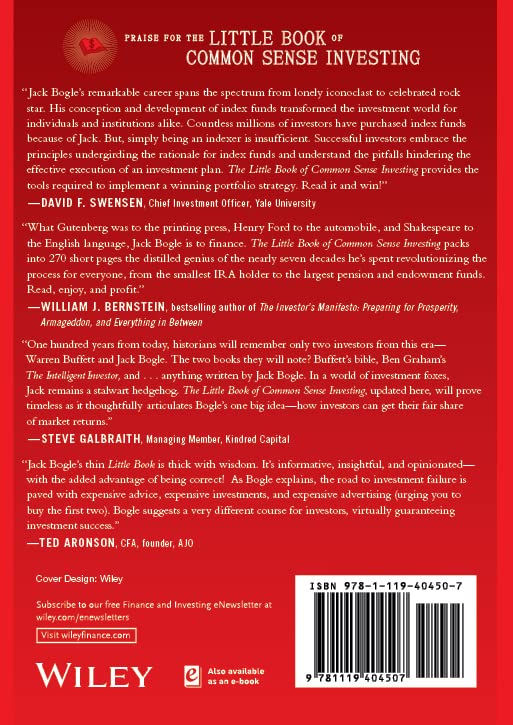
Introduction
John C. Bogle, the founder of Vanguard Group and creator of the first index mutual fund, is a name synonymous with the world of investing. His book, The Little Book of Common Sense Investing: The Only Way to Guarantee Your Fair Share of Stock Market Returns, stands as a testament to his investment philosophy, which advocates for simplicity, low costs, and long-term strategies. This book, published in 2017 as part of the “Little Books, Big Profits” series, is more than just a guide; it is a manifesto for individual investors seeking to achieve reliable returns through a straightforward approach to the stock market.
Overview
John C. Bogle’s primary thesis in this book is that the most effective way to invest in the stock market is not through active stock picking or market timing, but through broad-based index funds. He argues that by investing in low-cost index funds, investors can capture the market’s overall return, which historically has been robust and reliable over the long term.
John C Bogle

Throughout the book, Bogle emphasizes the concept of “common sense” investing—an approach grounded in the belief that the market, as a whole, will grow over time, and that attempting to outperform it through active management is not only futile but often counterproductive due to the high costs and inefficiencies involved.
The Core Message: Index Funds as the Optimal Investment
The cornerstone of Bogle’s argument is the superiority of index funds. An index fund is a type of mutual fund designed to replicate the performance of a specific market index, such as the S&P 500. Unlike actively managed funds, which involve fund managers making decisions about which stocks to buy and sell, index funds simply hold all the stocks in the index, thus providing broad market exposure.
John C. Bogle’s advocacy for index funds is rooted in two main advantages: low costs and market-matching returns. Active funds, with their frequent trading, research expenses, and management fees, often incur significant costs that eat into investor returns. By contrast, index funds typically have much lower expense ratios because they require less management and fewer transactions.
Moreover, Bogle illustrates that very few active managers consistently outperform the market over time. The data he presents shows that even the most successful managers often fail to sustain their outperformance, particularly when costs and taxes are taken into account. Therefore, Bogle argues, the rational choice for most investors is to aim for the market’s average return, which can be achieved through index funds at a lower cost and with less risk.
Long-Term Investing: Patience and Discipline
John C. Bogle’s philosophy is not just about choosing index funds but also about adopting a long-term investment horizon. He stresses the importance of patience and discipline, urging investors to stay the course even during periods of market volatility. Bogle reminds readers that the stock market is inherently volatile in the short term, but over the long term, it has historically trended upwards. This belief in the market’s long-term growth underpins his argument for a buy-and-hold strategy, where investors resist the temptation to react to market fluctuations.
The book provides historical evidence to support this long-term approach, showing that despite periodic downturns, the stock market has delivered substantial returns over decades. Bogle uses this evidence to dissuade readers from trying to time the market, which he argues is both extremely difficult and prone to failure. Instead, he advocates for consistent, regular investments in index funds, regardless of market conditions.
The Role of Costs in Investment Returns
One of the most compelling sections of the book is Bogle’s analysis of how costs impact investment returns. He introduces the concept of the “cost matters hypothesis,” which asserts that high fees and expenses can significantly erode an investor’s returns over time. Bogle provides numerous examples and statistical data to demonstrate how even seemingly small differences in expense ratios can compound over the years, leading to vastly different outcomes for investors.
Bogle also criticizes the financial industry for promoting high-cost investment products that often benefit fund managers more than the investors themselves. He argues that the interests of fund managers are frequently misaligned with those of investors, leading to a situation where the pursuit of profits by fund managers results in lower returns for their clients. The solution, according to Bogle, is to minimize costs by choosing low-cost index funds.
The Power of Compounding
Another key concept that John C. Bogle emphasizes is the power of compounding. He explains how reinvesting dividends and allowing returns to compound over time can lead to exponential growth in an investment portfolio. However, he also warns that compounding works both ways—high costs and fees can compound just as powerfully, but in the negative direction, reducing overall returns. This dual nature of compounding is a critical reason why Bogle insists on keeping investment costs as low as possible.
Critique of Active Management
Bogle is particularly critical of the active management industry, which he views as fundamentally flawed due to its inability to consistently outperform the market. He dissects the claims of active managers and provides evidence that their performance, on average, does not justify the higher fees they charge. Bogle attributes the failure of active management to several factors, including the high costs associated with active trading, the difficulty of consistently picking winning stocks, and the impact of human emotions, such as greed and fear, which can lead to poor decision-making.
While John C. Bogle acknowledges that some active managers do outperform the market, he argues that identifying these managers in advance is nearly impossible. Moreover, he points out that even those who have outperformed in the past may not continue to do so in the future. As a result, Bogle concludes that for most investors, the best strategy is to avoid the risks and costs associated with active management and instead focus on broad-based index funds.

Legacy and Impact
The Little Book of Common Sense Investing has had a profound impact on the investment community. John C. Bogle’s ideas, once considered unconventional, have become widely accepted, and index funds have grown in popularity among both individual and institutional investors. The principles laid out in this book have influenced countless financial advisors, educators, and investors, making it a cornerstone of modern investment strategy.
Bogle’s legacy is further cemented by the success of Vanguard, which has become one of the largest and most respected investment management companies in the world. The popularity of index funds and the shift towards low-cost investing can be directly attributed to Bogle’s advocacy and the clear, compelling case he makes in this book.
Conclusion
The Little Book of Common Sense Investing by John C. Bogle is more than just a guide to investing; it is a call to arms for investors to take control of their financial futures by embracing simplicity, minimizing costs, and adopting a long-term perspective. John C. Bogle’s message is clear and powerful: the best way to guarantee your fair share of stock market returns is not through complexity or speculation, but through the disciplined, low-cost, and patient approach of index fund investing.
For both novice and experienced investors, this book offers timeless wisdom that is as relevant today as it was when Bogle first began preaching the benefits of index funds. In a world of financial noise and distraction, John C. Bogle’s emphasis on common sense provides a refreshing and reliable path to investment success.
Check out The Little Book of Common Sense Investing on Amazon.
Check out John C. Bogle on Amazon.
If you like this review please share it with your friends and family, and why not check out our review of The Intelligent Investor by Benjamin Graham.
.
